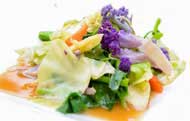





1. Cabbage Facts
2. Types of Cabbage
3. Cabbage Nutritional value
4. Cabbage Health Benefits
Cabbage (Brassica oleracea or variants) is a leafy green or purple vegetable. Cabbage is a very powerful vegetable with ancient healers declaring it to contain "moon power", as it grew in the moonlight. It has a very high sulphur and Vitamin C content.
History and Origin
Whilst it is not completely clear where cabbage originated, it is thought that it dates back to a province in China around 4,000 BC. It is then believed to have been transported to the Mediterranean region of Europe around 600 BC. Research indicates it was a domesticated vegetable during Greek and Roman times. It is known as one of the oldest of all vegetables.
Cabbage is considered one of the main vegetables in Russia with it being a key ingredient in some of their main national soups. Chinese scrolls from 1,000 BC regarded white cabbage as a cure for baldness in men. It is reported that during Captain Cook's first voyage in the 17th century, the ship's doctor used cabbage in a poultice to wrap around the wounds of any injured crew members, to stop gangrene from setting in.
- • Green Cabbage
- • Red or Purple Cabbage
- • Napa Cabbage
- • Savoy Cabbage
- • Bok Choy
- • Choy Sum
- • Tuscan Cabbage
- • Gai Choy
- • Pointed Cabbage
Common types of cabbage include green, red, Savoy, and Napa. Green and red varieties are characterized by their tight, compact leaves, while Savoy has crinkled, curly leaves and Napa cabbage has an oblong shape with looser, layered leaves. Other varieties include bok choy, which has thick stalks and dark leaves, and Brussels sprouts, which are small, individual buds.
Common types of cabbage
Green Cabbage: The most common variety, with tightly packed, pale to dark green leaves. It has a peppery flavour raw but sweetens when cooked.
Red Cabbage: Similar to green cabbage but with vibrant red or purple leaves. It can be denser and has a slightly peppery flavour.
Savoy Cabbage: Distinguished by its soft, crinkly or curly leaves, which can range in colour from light green to bluish green. It has a mild flavour.
Napa Cabbage: Also known as Chinese cabbage or wombok, it has an oblong shape with a dense base and loose, pale green, crinkly leaves. It is a staple in East Asian cuisine.
Other related varieties
Bok Choy: An Asian green with a shape similar to Napa cabbage but with looser, more tender dark green leaves and thick, white stalks.
Brussels Sprouts: Small, leafy buds that grow on a long stalk.
Pointed Cabbage: A variety with an elongated, cone-like shape and tender, sweet leaves.
Vegetables " Cabbage " ( Nutritional value )
Nutritional value per 100 g
Cabbage, cooked, boiled, drained, without salt
| Nutrient (Proximity) |
Unit
|
Value
|
Daily Value %
|
|
Energy
|
kcal
|
23
|
1.1%
|
|
Protein
|
g
|
1.27
|
2.5%
|
|
Total lipid (fat)
|
g
|
0.06
|
0.7%
|
|
Carbohydrate, by difference
|
g
|
5.51
|
2%
|
|
Fiber, total dietary
|
g
|
1.9
|
6.7%
|
|
Sugars, total
|
g
|
2.79
|
|
|
Minerals
|
|||
|
Calcium, Ca
|
mg
|
48
|
3.6%
|
|
Iron, Fe
|
mg
|
0.17
|
0.9%
|
|
Magnesium, Mg
|
mg
|
15
|
3.5%
|
|
Phosphorus, P
|
mg
|
33
|
2.6%
|
|
Potassium, K
|
mg
|
196
|
4.1%
|
|
Sodium, Na
|
mg
|
8
|
0.003%
|
|
Zinc, Zn
|
mg
|
0.20
|
1.8%
|
|
Copper, Cu
|
mg
|
0.017
|
1.8%
|
|
Manganese, Mn
|
mg
|
0.205
|
8.9%
|
|
Selenium, Se
|
mcg
|
0.6
|
1%
|
|
Fluoride, F
|
mcg
|
1.0
|
|
|
Vitamins
|
|||
|
Vitamin C, total ascorbic acid
|
mg
|
37.5
|
41.6%
|
|
Thiamin (B-1)
|
mg
|
0.061
|
5%
|
|
Riboflavin (B-2)
|
mg
|
0.038
|
2.9%
|
|
Niacin NE (niacin) (B-3)
|
mg
|
0.248
|
1.5%
|
|
Pantothenic acid (B-5)
|
mg
|
0.174
|
3.4%
|
|
Vitamin B-6
|
mg
|
0.112
|
6.5%
|
|
Folate DFE (dietary folate) (B-9)
|
mcg |
30
|
7.5%
|
|
Vitamin B-12
|
mcg
|
0.00
|
|
|
Vitamin A, RAE (retinol)
|
mcg
|
4
|
0.4%
|
|
Vitamin E (alpha-tocopherol)
|
mg
|
0.14
|
0.9%
|
|
Vitamin D (D2 + D3)
|
mcg
|
0
|
|
|
Vitamin K (phylloquinone)
|
mcg |
108.7
|
90.5%
|
|
Lipids
|
|||
|
Saturated Fatty Acids
|
g
|
0.000
|
|
|
Monounsaturated Fatty Acids
|
g
|
0.019
|
|
|
Polyunsaturated Fatty Acids
|
g
|
0.023
|
|
|
Trans Fatty Acids
|
g
|
0.000
|
|
|
Carotenoids
|
|||
|
Beta-Carotene
|
mcg
|
48
|
|
|
Lutein + zeaxanthin
|
mcg
|
27
|
|
|
Lycopene
|
mcg
|
0
|
|

|
Reference Values are based on a 2,000 Calorie Intake, for Adults and Children 4 or More Years of Age. Your daily values may be higher or lower depending on your calorie needs.
|
|
Percentages are roughly approximated using (RDA) Recommended Dietary Allowances for adults. Source: Nutrient Database - USDA (United States Department of Agriculture)
|
|
Reference Values for Nutrition - FDA U.S. Food and Drug Administration
|
Cabbage Nutritional Value
It is reported that during Captain Cook's first voyage in the 17th century, the ship's doctor used cabbage in a poultice to wrap around the wounds of any injured crew members, to stop grangrene from setting in.
Cabbage is beneficial for health due to its rich nutrient and antioxidant content, supporting everything from digestion and heart health to reduced inflammation and a stronger immune system. It contains vitamins C and K, fiber, and various antioxidants like anthocyanins and polyphenols. Eating cabbage can also aid in weight management and may help lower blood pressure and cholesterol.
- HEART HEALTH
Cabbage supports heart health by reducing inflammation, lowering blood pressure, and helping to manage cholesterol through its content of antioxidants, fiber, and potassium. Specifically, the anthocyanins in red cabbage lower blood pressure, while soluble fiber helps lower cholesterol and potassium counteracts sodium to maintain healthy blood pressure levels. - WEIGHT MANAGEMENT
Cabbage supports weight management because it is low in calories, high in water and fiber, which promotes fullness. It can be part of a healthy weight loss plan when included in a balanced diet, but restrictive diets like the Cabbage Soup Diet are not sustainable and can lead to side effects like bloating and muscle loss. - IMMUNE AND ANTI-INFLAMMATORY SUPPORT
Cabbage supports the immune system and has anti-inflammatory properties due to its rich content of antioxidants, such as vitamin C and phenolic compounds. These compounds help reduce cell damage from free radicals, lower inflammation markers in the body, and support immune function. Cabbage also contains beneficial compounds like anthocyanins (in red cabbage) and indoles which have powerful antioxidant and anti-inflammatory effects. - ARTHRITIS / RHEUMATISM / GOUT
Cabbage may help with arthritis, rheumatism, and gout due to its anti-inflammatory properties, while also being suitable for a gout diet. It contains sulforaphane, which may slow cartilage damage and reduce inflammation, and is low in purines, a key factor in managing gout. Additionally, traditional remedies involve using cabbage leaves as a compress for joint pain and swelling.

- SUPPORTS A HEALTHY GUT
Cabbage supports a healthy gut because it is a good source of fiber and acts as a prebiotic. The fiber aids digestion and promotes regular bowel movements, while the prebiotics feed beneficial gut bacteria, which are important for immune function and nutrient production. Fermented cabbage like sauerkraut and kimchi offers the added benefit of probiotics (live good bacteria) and may also protect the intestinal barrier. - CANCER PREVENTION
Cabbage may help prevent cancer due to its high content of glucosinolates, which are broken down into beneficial compounds like sulforaphane and indoles. These compounds have demonstrated cancer-fighting properties in studies, including the ability to inhibit cancer cell growth, boost detoxification enzymes, and influence cancer-related genes. Consuming a variety of cruciferous vegetables, including cabbage, is associated with a lower risk of certain cancers. - VISION HEALTH
Cabbage supports eye health due to its high content of antioxidants like lutein, zeaxanthin, and beta-carotene, which protect the eyes from age-related degeneration and improve vision. It also contains vitamins A and C, which are essential for healthy vision and act as protective antioxidants. - BONE HEALTH
Cabbage supports bone health primarily through its high content of vitamin K1, which is essential for blood clotting and for reducing bone breakdown to improve bone strength. It also contains smaller amounts of other bone-benefiting nutrients like calcium, manganese, and zinc, as well as vitamin C, which is important for bone formation.
References
Nutrient Database - USDA (United States Department of Agriculture)
Reference Values for Nutrition - FDA U.S. Food and Drug Administration
Supports a healthy gut - Cabbage supports a healthy gut because it is a good source of fiber and acts as a prebiotic. The fiber aids digestion and promotes regular bowel movements, while the prebiotics feed beneficial gut bacteria, which are important for immune function and nutrient production. Fermented cabbage like sauerkraut and kimchi offers the added benefit of probiotics (live good bacteria) and may also protect the intestinal barrier.
Heart health - Cabbage supports heart health by reducing inflammation, lowering blood pressure, and helping to manage cholesterol through its content of antioxidants, fiber, and potassium. Specifically, the anthocyanins in red cabbage lower blood pressure, while soluble fiber helps lower cholesterol and potassium counteracts sodium to maintain healthy blood pressure levels.
Immune and anti-inflammatory support - Cabbage supports the immune system and has anti-inflammatory properties due to its rich content of antioxidants, such as vitamin C and phenolic compounds. These compounds help reduce cell damage from free radicals, lower inflammation markers in the body, and support immune function. Cabbage also contains beneficial compounds like anthocyanins (in red cabbage) and indoles which have powerful antioxidant and anti-inflammatory effects.
Bone health - Cabbage supports bone health primarily through its high content of vitamin K1, which is essential for blood clotting and for reducing bone breakdown to improve bone strength. It also contains smaller amounts of other bone-benefiting nutrients like calcium, manganese, and zinc, as well as vitamin C, which is important for bone formation.
Vision health - Cabbage supports eye health due to its high content of antioxidants like lutein, zeaxanthin, and beta-carotene, which protect the eyes from age-related degeneration and improve vision. It also contains vitamins A and C, which are essential for healthy vision and act as protective antioxidants.
Cancer prevention - Cabbage may help prevent cancer due to its high content of glucosinolates, which are broken down into beneficial compounds like sulforaphane and indoles. These compounds have demonstrated cancer-fighting properties in studies, including the ability to inhibit cancer cell growth, boost detoxification enzymes, and influence cancer-related genes. Consuming a variety of cruciferous vegetables, including cabbage, is associated with a lower risk of certain cancers.
Weight management - Cabbage supports weight management because it is low in calories, high in water and fiber, which promotes fullness and helps reduce overall calorie intake. It can be part of a healthy weight loss plan when included in a balanced diet, but restrictive diets like the Cabbage Soup Diet are not sustainable and can lead to side effects like bloating and muscle loss.
Arthritis / Rheumatism / Gout - Cabbage may help with arthritis, rheumatism, and gout due to its anti-inflammatory properties, while also being suitable for a gout diet. It contains sulforaphane, which may slow cartilage damage and reduce inflammation, and is low in purines, a key factor in managing gout. Additionally, traditional remedies involve using cabbage leaves as a compress for joint pain and swelling.
